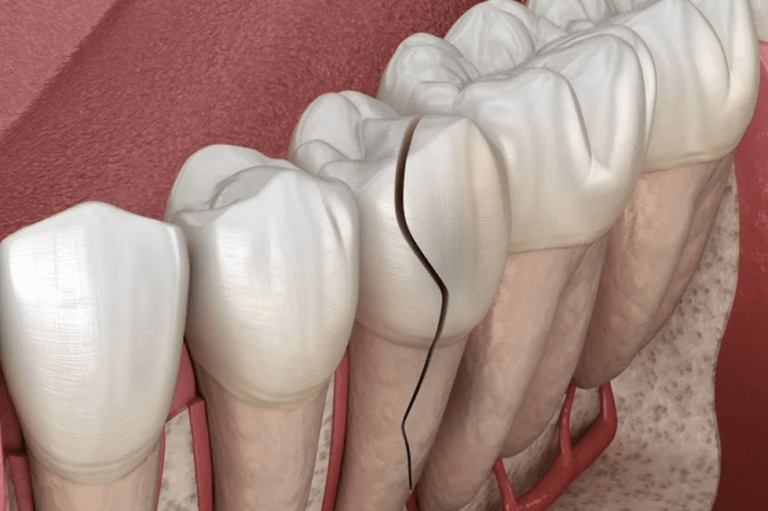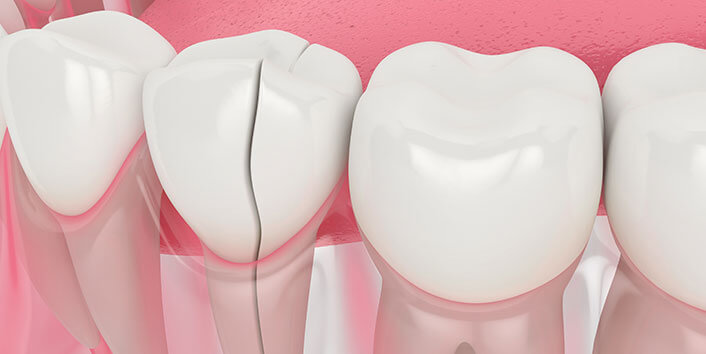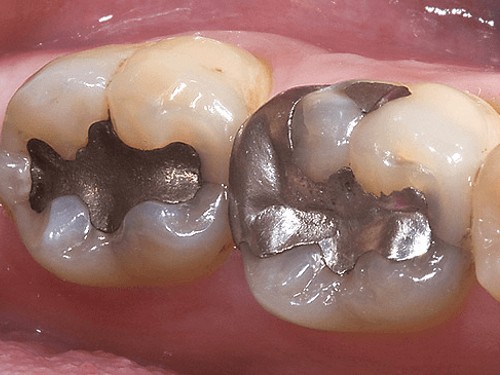Crack Tooth Syndrome

What Is Crack Tooth Syndrome?
Do you have unexplained dental pain but no obvious signs of decay or trauma? You could be dealing with Cracked Tooth Syndrome (CTS), a condition caused by tiny, often invisible cracks in your teeth. These cracks may be too small to show on x-rays, making CTS a challenge for dentists to diagnose. The crack could be limited to the tooth’s enamel or extend deeper into the tooth, even reaching the dental pulp or periodontal ligament.
Cracked Tooth Syndrome can cause discomfort that comes and goes, and without obvious symptoms, it’s easy for the condition to go untreated. A dentist can use a combination of clinical exams, digital dental x-rays, and sometimes advanced imaging like a 3D CBCT scan to detect CTS. Early diagnosis is key, as timely treatment can prevent more extensive damage and pain.
Before you contact a Toronto dentist to examine Crack Tooth Syndrome, there are some things you should know as a patient:
- What Causes Cracked Tooth Syndrome?
- Signs And Symptoms Of Crack Tooth Syndrome
- Treatment Options For Crack Tooth Syndrome
- Managing Crack Tooth Syndrome Until You Can See The Dentist
- Frequently Asked Questions About Crack Tooth Syndrome
If you have questions about Crack Tooth Syndrome or other dental problems, please contact us for more information.
What Causes Cracked Tooth Syndrome?
Several factors can lead to the development of Cracked Tooth Syndrome:
- Teeth Grinding (Bruxism): Grinding or clenching your teeth, especially during sleep, places excessive force on them. Over time, this can lead to micro-cracks. Wearing a night guard can help protect your teeth from the damaging effects of bruxism.
- Dental Trauma: Accidents, sports injuries, or biting on something hard can cause cracks. Even if there’s no visible damage, the tooth’s internal structure may be compromised, leading to CTS.
- Large Dental Fillings: Teeth that have undergone extensive dental work, particularly large fillings, are more prone to cracking as the remaining tooth structure becomes weakened.
- Previous Root Canal Treatment: Teeth that have undergone root canal therapy are more susceptible to cracking, as they can become brittle over time due to the loss of internal moisture and nutrients.
These factors work in combination or individually to create the conditions that result in Crack Tooth Syndrome. If you suspect you have Crack Tooth Syndrome or are experiencing dental pain, it’s crucial to seek prompt dental care. For more information about Crack Tooth Syndrome, please contact us.

Signs And Symptoms Of Crack Tooth Syndrome
CTS can be tricky to diagnose because its symptoms are often intermittent or subtle. Here are the most common signs:
- Pain When Biting or Chewing: This discomfort may only occur when pressure is applied to the tooth, and the pain usually subsides once you stop biting.
- Sensitivity to Temperature or Sweets: If you notice pain when consuming cold foods or sugary items, this could be due to irritants entering the crack and reaching the sensitive inner layers of the tooth.
- Rebound Pain: You may feel pain when releasing your bite, often after chewing fibrous foods.
- Tooth Grinding Discomfort: Pressure from grinding or certain jaw movements can worsen pain in the affected tooth.
- Difficulty Identifying the Problem Tooth: Since the pulp lacks nerve fibers that localize pain, it may be hard to pinpoint which tooth is cracked.
If you experience any of these symptoms, it’s essential to visit a dentist for a thorough evaluation. For more information about Crack Tooth Syndrome, please contact us.
Treatment Options For Crack Tooth Syndrome
The treatment for CTS depends on the location and severity of the crack:
- For Superficial Cracks: Minor cracks may be treated with a dental crown to protect the tooth and prevent the crack from worsening.
- For Deep Cracks Involving the Pulp: When the crack extends into the tooth’s pulp, a root canal treatment may be necessary, followed by a crown to restore the tooth’s strength.
- For Irreparable Cracks: If the crack extends into the tooth root, extraction may be required. In such cases, a dental implant or bridge can replace the missing tooth.
By understanding these treatment options and their outcomes, you can make informed decisions regarding your oral health and work with your dentist to choose the most appropriate approach for your specific situation. For more information about Crack Tooth Syndrome, please contact us.

Managing Crack Tooth Syndrome Until You Can See The Dentist
While it’s important to get professional treatment, there are steps you can take to manage the pain and prevent further damage until your appointment:
- Over-the-Counter Pain Relief: Medications like ibuprofen or acetaminophen can help ease the pain. For severe pain, you can take 600 mg of ibuprofen with 1000 mg of acetaminophen every 4–6 hours (if advised by your healthcare provider).
- Maintain Good Oral Hygiene: Gently brushing and flossing can keep the area clean and reduce the risk of infection. You can also rinse with warm salt water to soothe the tooth.
- Avoid Hot, Cold, and Hard Foods: Stick to room-temperature, soft foods to avoid aggravating the cracked tooth.
- Use a Cold Compress: Apply a cold compress to the affected side of your face to reduce swelling and discomfort.
- Chew on the Other Side: Avoid putting pressure on the cracked tooth by chewing on the unaffected side of your mouth.
These tips can help manage your discomfort, but they are not a replacement for professional dental care. If you suspect you have Cracked Tooth Syndrome, it’s important to visit your dentist as soon as possible for proper diagnosis and treatment. For more information about Crack Tooth Syndrome, please contact us.
Frequently Asked Questions About Crack Tooth Syndrome
- Can CTS heal on its own?
No, cracked teeth cannot heal naturally. Prompt treatment is needed to prevent the crack from worsening.
Is CTS common in teeth with fillings?
Yes, large fillings weaken the tooth structure, making it more prone to cracks.
What happens if CTS is left untreated?
Untreated CTS can lead to severe pain, tooth fractures, or the need for extraction if the crack spreads to the root.
- Can wearing a night guard help with CTS?
Yes, a night guard can prevent further damage from teeth grinding, a common cause of CTS.
Crack Tooth Syndrome can lead to significant discomfort and long-term damage if left untreated, but timely diagnosis and treatment can preserve your tooth and alleviate pain. For more information about Crack Tooth Syndrome, please contact us.

